Report: The Detrimental Effects of Alcohol Abuse on the Body
VerifiedAdded on 2021/02/20
|7
|1488
|23
Report
AI Summary
This report provides a detailed overview of the effects of alcohol abuse on the human body. It begins with an introduction defining alcohol abuse and its potential for physical dependency. The main body delves into both short-term and long-term effects, including skin flushing, loss of coordination, memory loss, and organ damage. It further explores the impact on various body systems, such as the liver, digestive system, pancreas, central nervous system, cardiovascular health, and reproductive health. The report also addresses the psychological effects of alcohol abuse, including mental health problems. A significant portion focuses on the endocrine system, discussing how alcohol disrupts hormone production, utilization, and storage, leading to various disorders. The conclusion summarizes the detrimental impacts of alcohol abuse on overall health and well-being. The report is supported by several references including books, journals and online resources.
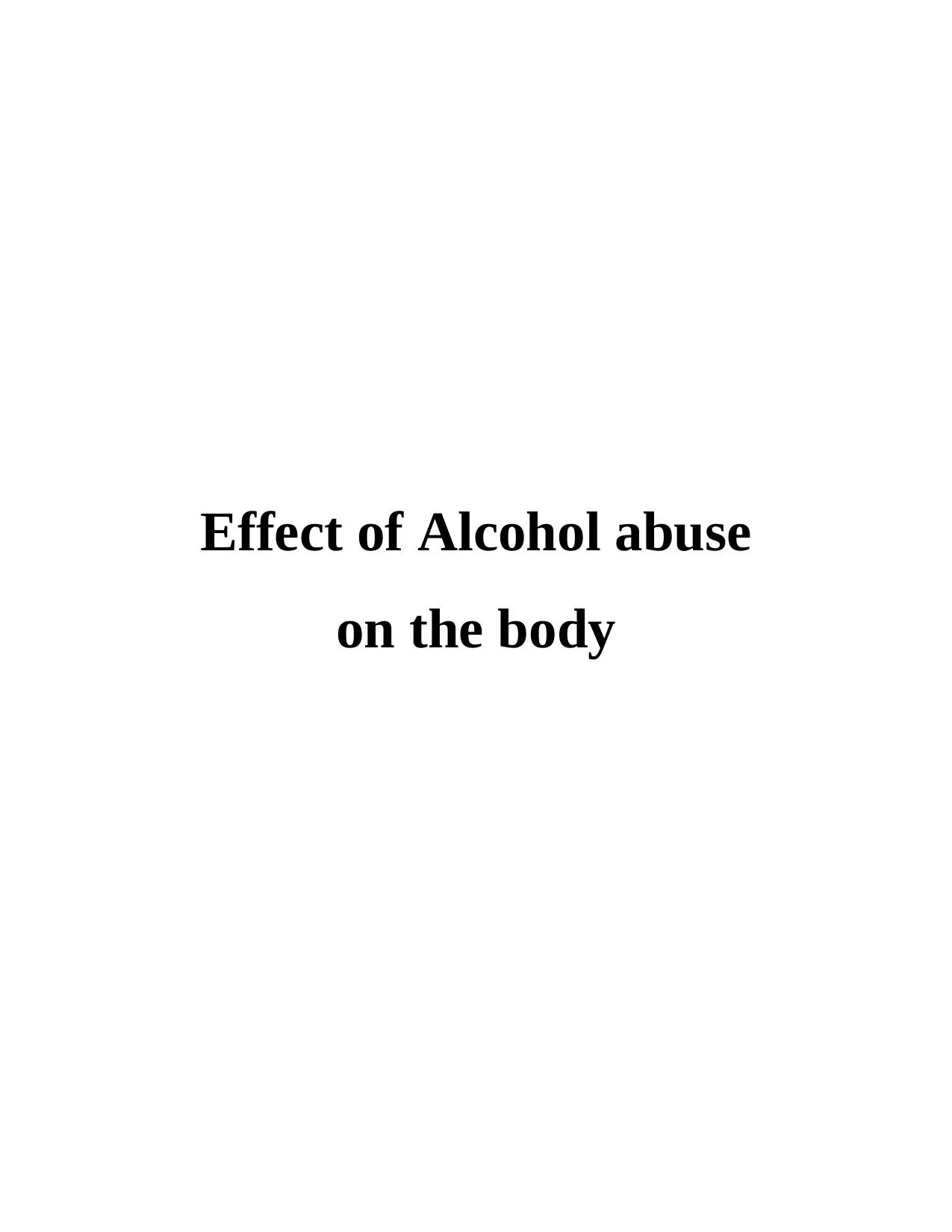
Effect of Alcohol abuse
on the body
on the body
Paraphrase This Document
Need a fresh take? Get an instant paraphrase of this document with our AI Paraphraser

Table of Contents
INTRODUCTION...........................................................................................................................1
MAIN BODY...................................................................................................................................1
CONCLUSION................................................................................................................................3
REFERENCES................................................................................................................................4
INTRODUCTION...........................................................................................................................1
MAIN BODY...................................................................................................................................1
CONCLUSION................................................................................................................................3
REFERENCES................................................................................................................................4

⊘ This is a preview!⊘
Do you want full access?
Subscribe today to unlock all pages.

Trusted by 1+ million students worldwide
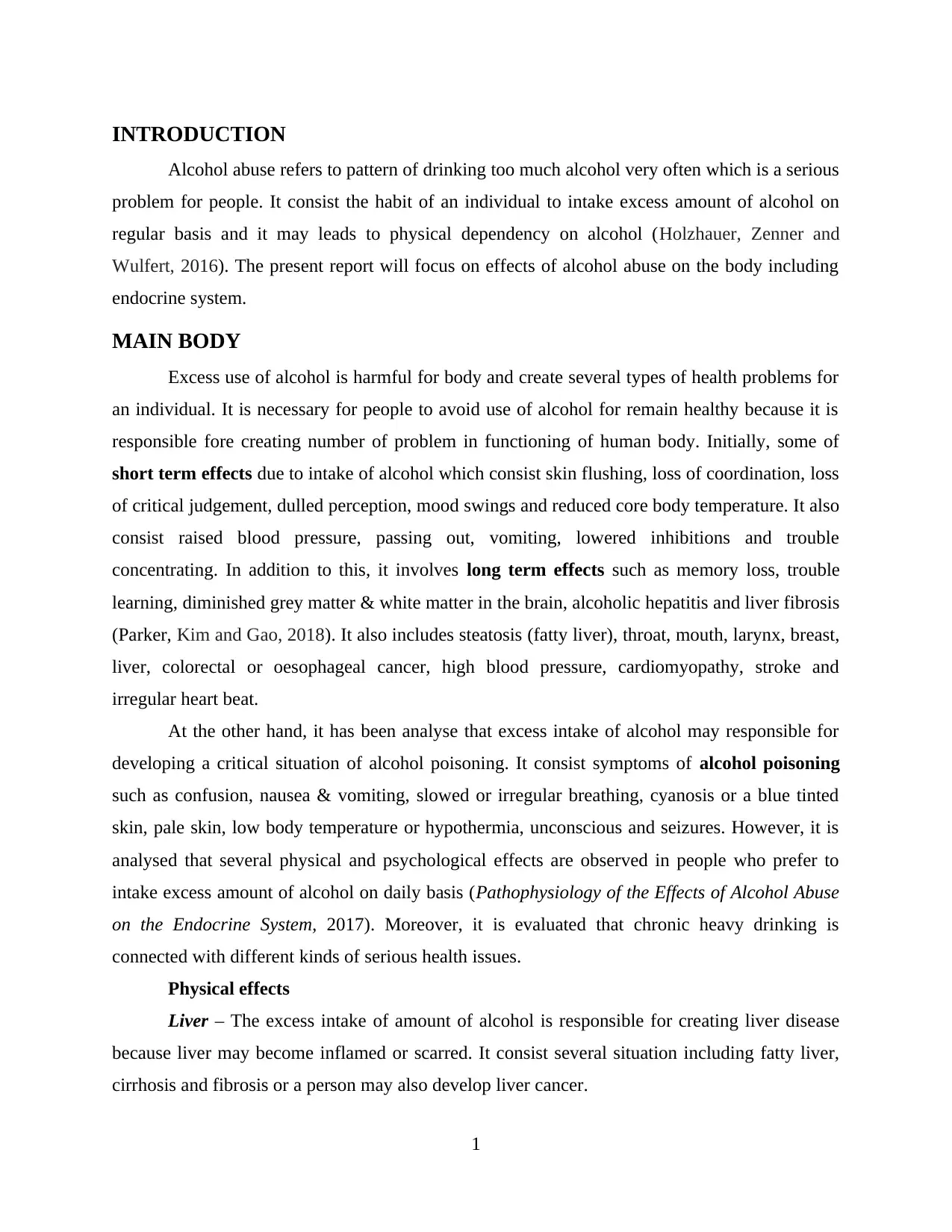
INTRODUCTION
Alcohol abuse refers to pattern of drinking too much alcohol very often which is a serious
problem for people. It consist the habit of an individual to intake excess amount of alcohol on
regular basis and it may leads to physical dependency on alcohol (Holzhauer, Zenner and
Wulfert, 2016). The present report will focus on effects of alcohol abuse on the body including
endocrine system.
MAIN BODY
Excess use of alcohol is harmful for body and create several types of health problems for
an individual. It is necessary for people to avoid use of alcohol for remain healthy because it is
responsible fore creating number of problem in functioning of human body. Initially, some of
short term effects due to intake of alcohol which consist skin flushing, loss of coordination, loss
of critical judgement, dulled perception, mood swings and reduced core body temperature. It also
consist raised blood pressure, passing out, vomiting, lowered inhibitions and trouble
concentrating. In addition to this, it involves long term effects such as memory loss, trouble
learning, diminished grey matter & white matter in the brain, alcoholic hepatitis and liver fibrosis
(Parker, Kim and Gao, 2018). It also includes steatosis (fatty liver), throat, mouth, larynx, breast,
liver, colorectal or oesophageal cancer, high blood pressure, cardiomyopathy, stroke and
irregular heart beat.
At the other hand, it has been analyse that excess intake of alcohol may responsible for
developing a critical situation of alcohol poisoning. It consist symptoms of alcohol poisoning
such as confusion, nausea & vomiting, slowed or irregular breathing, cyanosis or a blue tinted
skin, pale skin, low body temperature or hypothermia, unconscious and seizures. However, it is
analysed that several physical and psychological effects are observed in people who prefer to
intake excess amount of alcohol on daily basis (Pathophysiology of the Effects of Alcohol Abuse
on the Endocrine System, 2017). Moreover, it is evaluated that chronic heavy drinking is
connected with different kinds of serious health issues.
Physical effects
Liver – The excess intake of amount of alcohol is responsible for creating liver disease
because liver may become inflamed or scarred. It consist several situation including fatty liver,
cirrhosis and fibrosis or a person may also develop liver cancer.
1
Alcohol abuse refers to pattern of drinking too much alcohol very often which is a serious
problem for people. It consist the habit of an individual to intake excess amount of alcohol on
regular basis and it may leads to physical dependency on alcohol (Holzhauer, Zenner and
Wulfert, 2016). The present report will focus on effects of alcohol abuse on the body including
endocrine system.
MAIN BODY
Excess use of alcohol is harmful for body and create several types of health problems for
an individual. It is necessary for people to avoid use of alcohol for remain healthy because it is
responsible fore creating number of problem in functioning of human body. Initially, some of
short term effects due to intake of alcohol which consist skin flushing, loss of coordination, loss
of critical judgement, dulled perception, mood swings and reduced core body temperature. It also
consist raised blood pressure, passing out, vomiting, lowered inhibitions and trouble
concentrating. In addition to this, it involves long term effects such as memory loss, trouble
learning, diminished grey matter & white matter in the brain, alcoholic hepatitis and liver fibrosis
(Parker, Kim and Gao, 2018). It also includes steatosis (fatty liver), throat, mouth, larynx, breast,
liver, colorectal or oesophageal cancer, high blood pressure, cardiomyopathy, stroke and
irregular heart beat.
At the other hand, it has been analyse that excess intake of alcohol may responsible for
developing a critical situation of alcohol poisoning. It consist symptoms of alcohol poisoning
such as confusion, nausea & vomiting, slowed or irregular breathing, cyanosis or a blue tinted
skin, pale skin, low body temperature or hypothermia, unconscious and seizures. However, it is
analysed that several physical and psychological effects are observed in people who prefer to
intake excess amount of alcohol on daily basis (Pathophysiology of the Effects of Alcohol Abuse
on the Endocrine System, 2017). Moreover, it is evaluated that chronic heavy drinking is
connected with different kinds of serious health issues.
Physical effects
Liver – The excess intake of amount of alcohol is responsible for creating liver disease
because liver may become inflamed or scarred. It consist several situation including fatty liver,
cirrhosis and fibrosis or a person may also develop liver cancer.
1
Paraphrase This Document
Need a fresh take? Get an instant paraphrase of this document with our AI Paraphraser
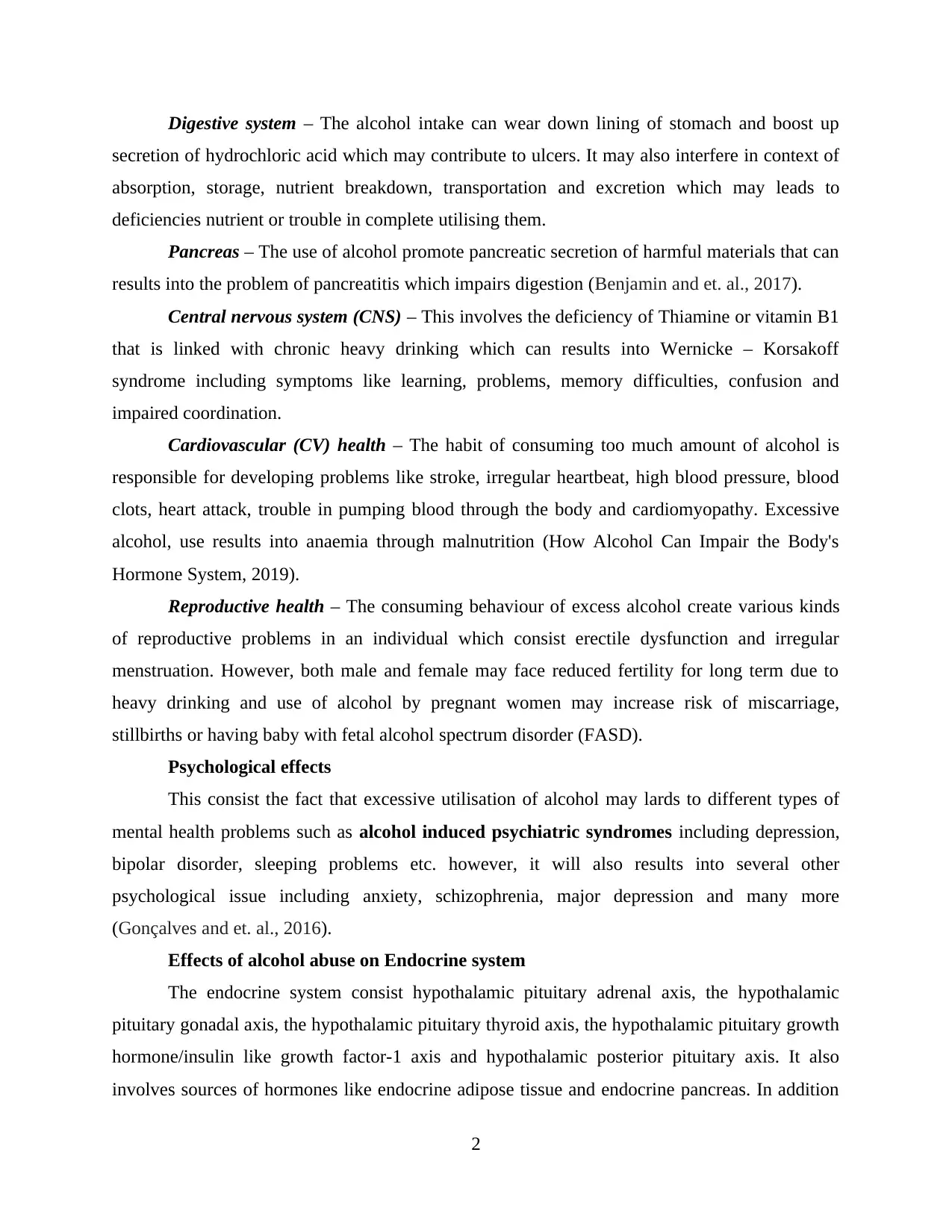
Digestive system – The alcohol intake can wear down lining of stomach and boost up
secretion of hydrochloric acid which may contribute to ulcers. It may also interfere in context of
absorption, storage, nutrient breakdown, transportation and excretion which may leads to
deficiencies nutrient or trouble in complete utilising them.
Pancreas – The use of alcohol promote pancreatic secretion of harmful materials that can
results into the problem of pancreatitis which impairs digestion (Benjamin and et. al., 2017).
Central nervous system (CNS) – This involves the deficiency of Thiamine or vitamin B1
that is linked with chronic heavy drinking which can results into Wernicke – Korsakoff
syndrome including symptoms like learning, problems, memory difficulties, confusion and
impaired coordination.
Cardiovascular (CV) health – The habit of consuming too much amount of alcohol is
responsible for developing problems like stroke, irregular heartbeat, high blood pressure, blood
clots, heart attack, trouble in pumping blood through the body and cardiomyopathy. Excessive
alcohol, use results into anaemia through malnutrition (How Alcohol Can Impair the Body's
Hormone System, 2019).
Reproductive health – The consuming behaviour of excess alcohol create various kinds
of reproductive problems in an individual which consist erectile dysfunction and irregular
menstruation. However, both male and female may face reduced fertility for long term due to
heavy drinking and use of alcohol by pregnant women may increase risk of miscarriage,
stillbirths or having baby with fetal alcohol spectrum disorder (FASD).
Psychological effects
This consist the fact that excessive utilisation of alcohol may lards to different types of
mental health problems such as alcohol induced psychiatric syndromes including depression,
bipolar disorder, sleeping problems etc. however, it will also results into several other
psychological issue including anxiety, schizophrenia, major depression and many more
(Gonçalves and et. al., 2016).
Effects of alcohol abuse on Endocrine system
The endocrine system consist hypothalamic pituitary adrenal axis, the hypothalamic
pituitary gonadal axis, the hypothalamic pituitary thyroid axis, the hypothalamic pituitary growth
hormone/insulin like growth factor-1 axis and hypothalamic posterior pituitary axis. It also
involves sources of hormones like endocrine adipose tissue and endocrine pancreas. In addition
2
secretion of hydrochloric acid which may contribute to ulcers. It may also interfere in context of
absorption, storage, nutrient breakdown, transportation and excretion which may leads to
deficiencies nutrient or trouble in complete utilising them.
Pancreas – The use of alcohol promote pancreatic secretion of harmful materials that can
results into the problem of pancreatitis which impairs digestion (Benjamin and et. al., 2017).
Central nervous system (CNS) – This involves the deficiency of Thiamine or vitamin B1
that is linked with chronic heavy drinking which can results into Wernicke – Korsakoff
syndrome including symptoms like learning, problems, memory difficulties, confusion and
impaired coordination.
Cardiovascular (CV) health – The habit of consuming too much amount of alcohol is
responsible for developing problems like stroke, irregular heartbeat, high blood pressure, blood
clots, heart attack, trouble in pumping blood through the body and cardiomyopathy. Excessive
alcohol, use results into anaemia through malnutrition (How Alcohol Can Impair the Body's
Hormone System, 2019).
Reproductive health – The consuming behaviour of excess alcohol create various kinds
of reproductive problems in an individual which consist erectile dysfunction and irregular
menstruation. However, both male and female may face reduced fertility for long term due to
heavy drinking and use of alcohol by pregnant women may increase risk of miscarriage,
stillbirths or having baby with fetal alcohol spectrum disorder (FASD).
Psychological effects
This consist the fact that excessive utilisation of alcohol may lards to different types of
mental health problems such as alcohol induced psychiatric syndromes including depression,
bipolar disorder, sleeping problems etc. however, it will also results into several other
psychological issue including anxiety, schizophrenia, major depression and many more
(Gonçalves and et. al., 2016).
Effects of alcohol abuse on Endocrine system
The endocrine system consist hypothalamic pituitary adrenal axis, the hypothalamic
pituitary gonadal axis, the hypothalamic pituitary thyroid axis, the hypothalamic pituitary growth
hormone/insulin like growth factor-1 axis and hypothalamic posterior pituitary axis. It also
involves sources of hormones like endocrine adipose tissue and endocrine pancreas. In addition
2
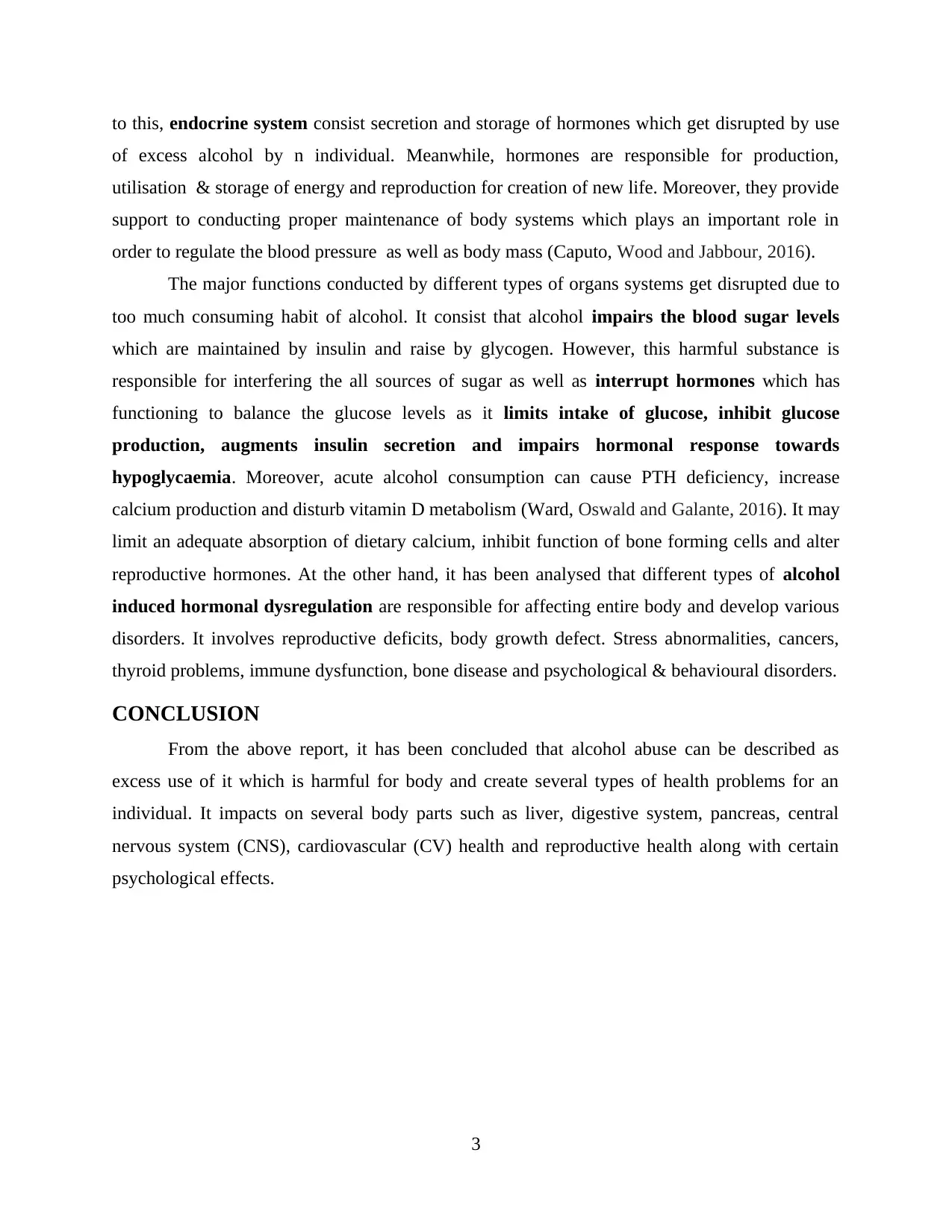
to this, endocrine system consist secretion and storage of hormones which get disrupted by use
of excess alcohol by n individual. Meanwhile, hormones are responsible for production,
utilisation & storage of energy and reproduction for creation of new life. Moreover, they provide
support to conducting proper maintenance of body systems which plays an important role in
order to regulate the blood pressure as well as body mass (Caputo, Wood and Jabbour, 2016).
The major functions conducted by different types of organs systems get disrupted due to
too much consuming habit of alcohol. It consist that alcohol impairs the blood sugar levels
which are maintained by insulin and raise by glycogen. However, this harmful substance is
responsible for interfering the all sources of sugar as well as interrupt hormones which has
functioning to balance the glucose levels as it limits intake of glucose, inhibit glucose
production, augments insulin secretion and impairs hormonal response towards
hypoglycaemia. Moreover, acute alcohol consumption can cause PTH deficiency, increase
calcium production and disturb vitamin D metabolism (Ward, Oswald and Galante, 2016). It may
limit an adequate absorption of dietary calcium, inhibit function of bone forming cells and alter
reproductive hormones. At the other hand, it has been analysed that different types of alcohol
induced hormonal dysregulation are responsible for affecting entire body and develop various
disorders. It involves reproductive deficits, body growth defect. Stress abnormalities, cancers,
thyroid problems, immune dysfunction, bone disease and psychological & behavioural disorders.
CONCLUSION
From the above report, it has been concluded that alcohol abuse can be described as
excess use of it which is harmful for body and create several types of health problems for an
individual. It impacts on several body parts such as liver, digestive system, pancreas, central
nervous system (CNS), cardiovascular (CV) health and reproductive health along with certain
psychological effects.
3
of excess alcohol by n individual. Meanwhile, hormones are responsible for production,
utilisation & storage of energy and reproduction for creation of new life. Moreover, they provide
support to conducting proper maintenance of body systems which plays an important role in
order to regulate the blood pressure as well as body mass (Caputo, Wood and Jabbour, 2016).
The major functions conducted by different types of organs systems get disrupted due to
too much consuming habit of alcohol. It consist that alcohol impairs the blood sugar levels
which are maintained by insulin and raise by glycogen. However, this harmful substance is
responsible for interfering the all sources of sugar as well as interrupt hormones which has
functioning to balance the glucose levels as it limits intake of glucose, inhibit glucose
production, augments insulin secretion and impairs hormonal response towards
hypoglycaemia. Moreover, acute alcohol consumption can cause PTH deficiency, increase
calcium production and disturb vitamin D metabolism (Ward, Oswald and Galante, 2016). It may
limit an adequate absorption of dietary calcium, inhibit function of bone forming cells and alter
reproductive hormones. At the other hand, it has been analysed that different types of alcohol
induced hormonal dysregulation are responsible for affecting entire body and develop various
disorders. It involves reproductive deficits, body growth defect. Stress abnormalities, cancers,
thyroid problems, immune dysfunction, bone disease and psychological & behavioural disorders.
CONCLUSION
From the above report, it has been concluded that alcohol abuse can be described as
excess use of it which is harmful for body and create several types of health problems for an
individual. It impacts on several body parts such as liver, digestive system, pancreas, central
nervous system (CNS), cardiovascular (CV) health and reproductive health along with certain
psychological effects.
3
⊘ This is a preview!⊘
Do you want full access?
Subscribe today to unlock all pages.

Trusted by 1+ million students worldwide
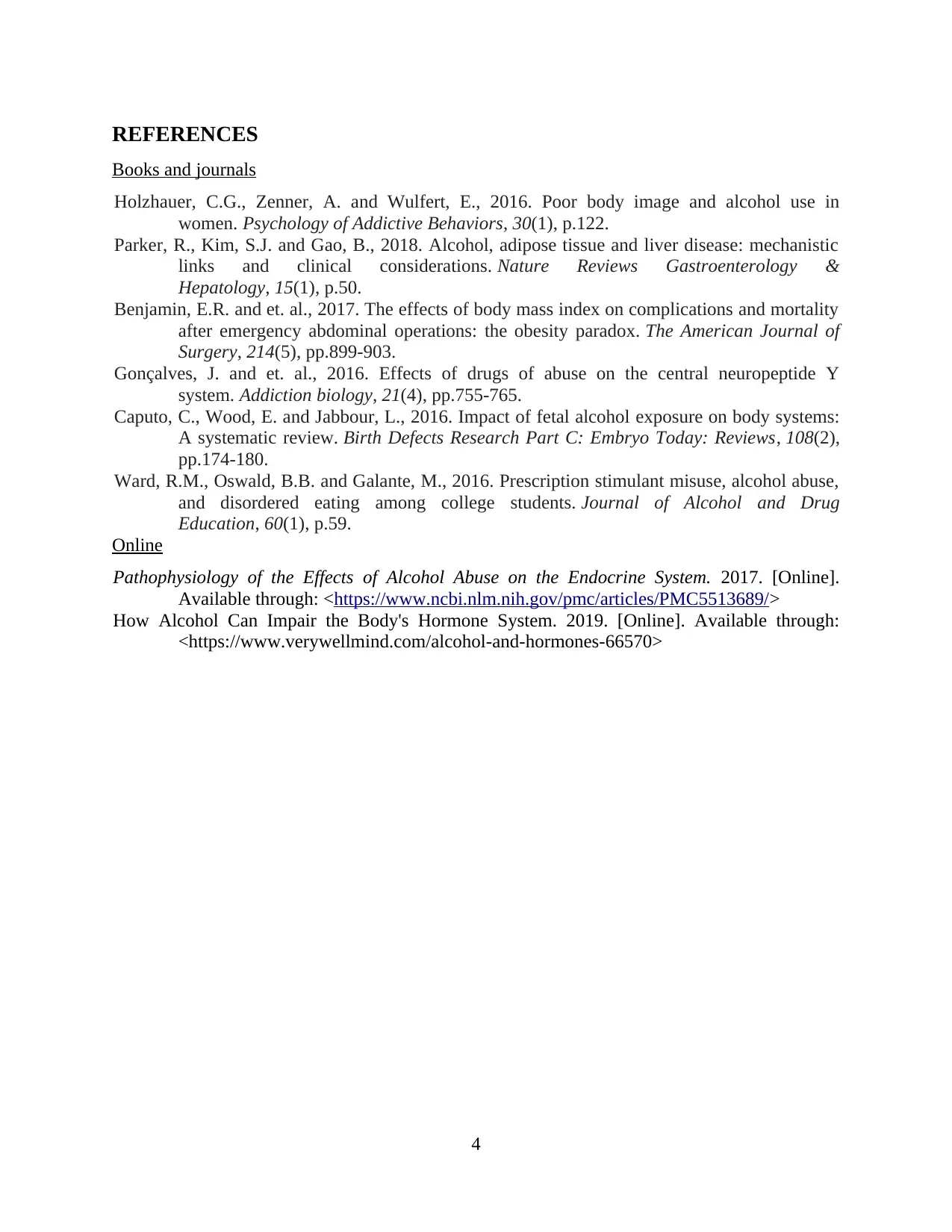
REFERENCES
Books and journals
Holzhauer, C.G., Zenner, A. and Wulfert, E., 2016. Poor body image and alcohol use in
women. Psychology of Addictive Behaviors, 30(1), p.122.
Parker, R., Kim, S.J. and Gao, B., 2018. Alcohol, adipose tissue and liver disease: mechanistic
links and clinical considerations. Nature Reviews Gastroenterology &
Hepatology, 15(1), p.50.
Benjamin, E.R. and et. al., 2017. The effects of body mass index on complications and mortality
after emergency abdominal operations: the obesity paradox. The American Journal of
Surgery, 214(5), pp.899-903.
Gonçalves, J. and et. al., 2016. Effects of drugs of abuse on the central neuropeptide Y
system. Addiction biology, 21(4), pp.755-765.
Caputo, C., Wood, E. and Jabbour, L., 2016. Impact of fetal alcohol exposure on body systems:
A systematic review. Birth Defects Research Part C: Embryo Today: Reviews, 108(2),
pp.174-180.
Ward, R.M., Oswald, B.B. and Galante, M., 2016. Prescription stimulant misuse, alcohol abuse,
and disordered eating among college students. Journal of Alcohol and Drug
Education, 60(1), p.59.
Online
Pathophysiology of the Effects of Alcohol Abuse on the Endocrine System. 2017. [Online].
Available through: <https://www.ncbi.nlm.nih.gov/pmc/articles/PMC5513689/>
How Alcohol Can Impair the Body's Hormone System. 2019. [Online]. Available through:
<https://www.verywellmind.com/alcohol-and-hormones-66570>
4
Books and journals
Holzhauer, C.G., Zenner, A. and Wulfert, E., 2016. Poor body image and alcohol use in
women. Psychology of Addictive Behaviors, 30(1), p.122.
Parker, R., Kim, S.J. and Gao, B., 2018. Alcohol, adipose tissue and liver disease: mechanistic
links and clinical considerations. Nature Reviews Gastroenterology &
Hepatology, 15(1), p.50.
Benjamin, E.R. and et. al., 2017. The effects of body mass index on complications and mortality
after emergency abdominal operations: the obesity paradox. The American Journal of
Surgery, 214(5), pp.899-903.
Gonçalves, J. and et. al., 2016. Effects of drugs of abuse on the central neuropeptide Y
system. Addiction biology, 21(4), pp.755-765.
Caputo, C., Wood, E. and Jabbour, L., 2016. Impact of fetal alcohol exposure on body systems:
A systematic review. Birth Defects Research Part C: Embryo Today: Reviews, 108(2),
pp.174-180.
Ward, R.M., Oswald, B.B. and Galante, M., 2016. Prescription stimulant misuse, alcohol abuse,
and disordered eating among college students. Journal of Alcohol and Drug
Education, 60(1), p.59.
Online
Pathophysiology of the Effects of Alcohol Abuse on the Endocrine System. 2017. [Online].
Available through: <https://www.ncbi.nlm.nih.gov/pmc/articles/PMC5513689/>
How Alcohol Can Impair the Body's Hormone System. 2019. [Online]. Available through:
<https://www.verywellmind.com/alcohol-and-hormones-66570>
4
1 out of 7
Your All-in-One AI-Powered Toolkit for Academic Success.
+13062052269
info@desklib.com
Available 24*7 on WhatsApp / Email
![[object Object]](/_next/static/media/star-bottom.7253800d.svg)
Unlock your academic potential
Copyright © 2020–2026 A2Z Services. All Rights Reserved. Developed and managed by ZUCOL.


